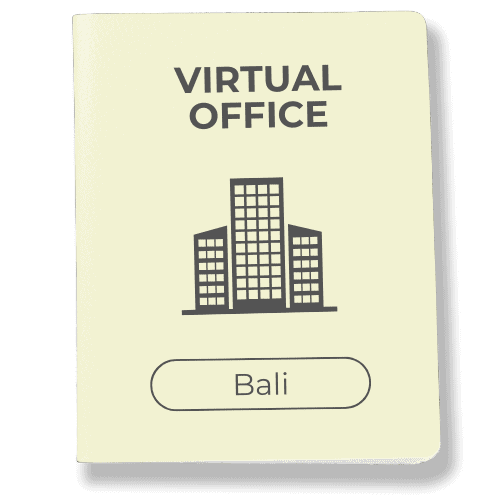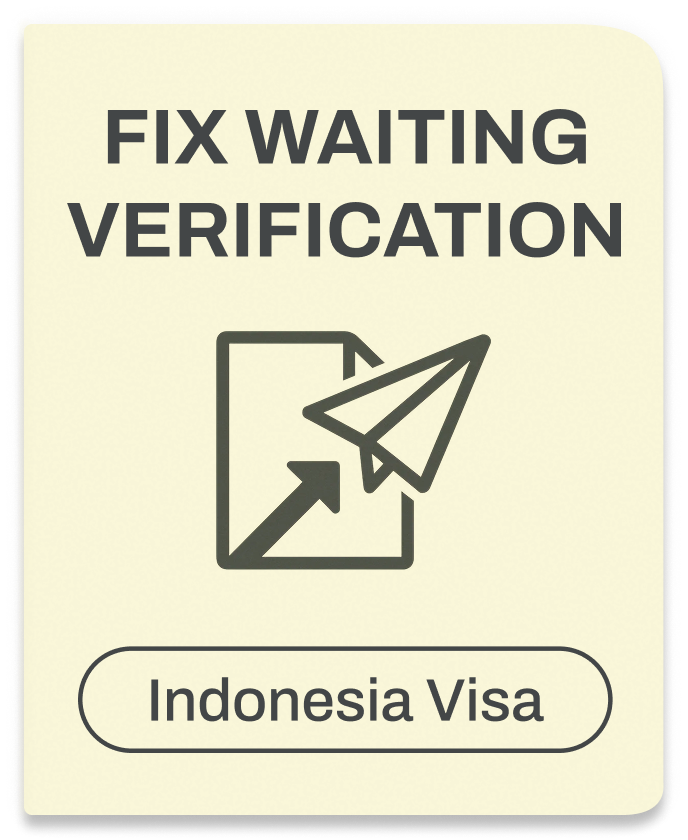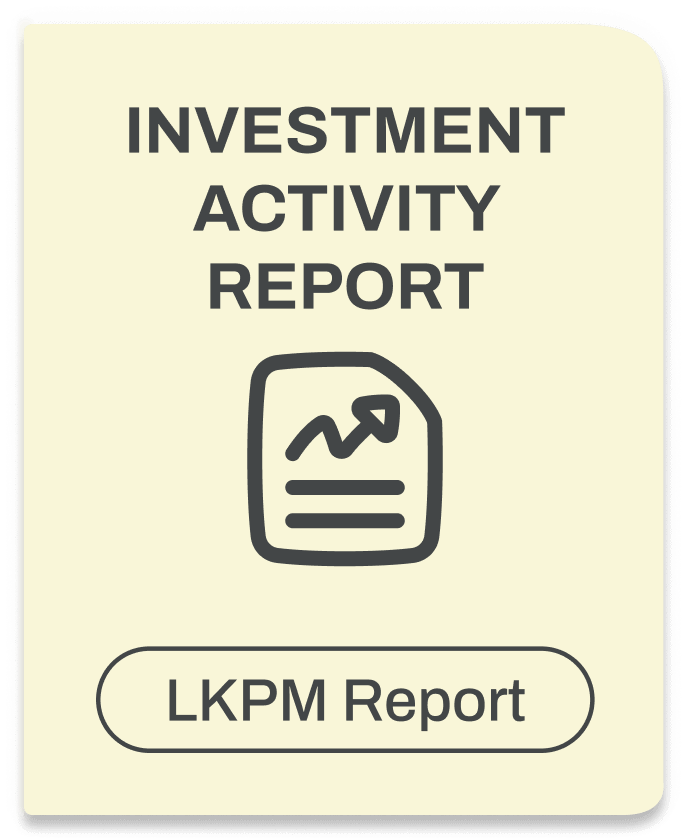10 Best Places to Retire in Bali (2026)
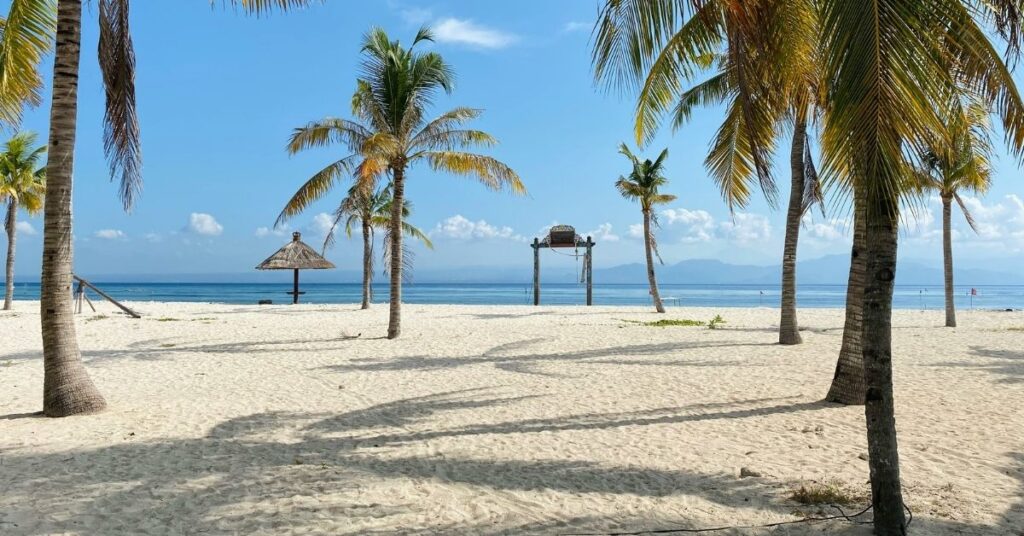
People love asking, “What’s the best place to retire in Bali?” But the smarter question is, “Which one fits me best?” Each place in Bali has its own rhythm, price tag, and pace of life.
For example, if stairs are starting to win the battle, Sanur’s your place. It has flat paths, ocean breeze, and easy walks. Or, need to be minutes from an English-speaking doctor? You’ll love the Denpasar–Sanur corridor. And if you’re craving quiet mornings and no traffic horns? Try Lovina or Candidasa up north.
This guide helps you find your perfect match using ten real-life factors: rent, hospitals, safety, community, and more. I’ve built scorecards for each neighbourhood, gathered fresh 2025 prices, and talked with expats who’ve already made the move.
One quick heads-up before we dive in: Bali changes fast. Visa rules, taxes, and housing costs often shift. Everything here’s accurate as of October 2025, but double-check with a reliable immigration agent or tax advisor before you settle in.
Ready? Let’s start with what most retirees care about first
Choosing Your Retirement Destination: What Really Matters
Tourist guides focus on Bali’s stunning beaches and cultural attractions. But to retire comfortably, you need practical details about medical services, the local community, and whether you can navigate daily life without constant frustration.
Here are the factors that determine the best place to retire in Bali:
- Walkability and terrain: Can you reach local amenities on foot, or do you need transport for everything?
- Healthcare facilities: How quickly can you access quality healthcare during emergencies?
- Medical insurance compatibility: Do hospitals accept direct billing from health insurance providers?
- Noise levels: Will you enjoy peaceful evenings, or battle late-night disturbances?
- Traffic conditions: Is getting around relatively stress-free?
- Community demographics: Does the area have a thriving expat community with people your age?
- Safety standards: Can you walk comfortably after dark?
- English accessibility: Are medical services and local staff comfortable with English?
- Living expenses: What does a lease agreement actually cost monthly?
- Daily conveniences: Are supermarkets, pharmacies, and essential shops nearby?
Quick Picks for Different Retirement Styles
Most walkable with flat terrain: Sanur features a 5-kilometer paved beachfront promenade perfect for morning walks without stairs or steep inclines.
Best access to medical facilities: The Denpasar-Sanur corridor places you near BIMC Hospital Nusa Dua, Kasih Ibu Hospital, Siloam, and Sanur International Hospital. Medical clinics and pharmacies are everywhere.
Affordable retirement options: Candidasa and Lovina offer stunning natural beauty and ocean views at lower costs, though healthcare facilities are further away.
Luxury with tranquility: Nusa Dua provides a resort-style environment with golf courses, luxury resorts, and minimal noise. Expect higher living expenses but maximum comfort.
Cultural and spiritual heart: Ubud surrounds you with lush rice terraces, yoga studios, and rich culture. The trade-off: hills, stairs, and distance from major hospitals.
Vibrant nightlife and social scene: Canggu, Pererenan, and Seminyak offer fine dining restaurants, coworking spaces, and a thriving social scene. Downsides include traffic congestion and higher rental costs.
Dramatic views but car-dependent: Uluwatu delivers clifftop vistas and stunning beaches, but steep driveways and stairs make a local driving license essential.
10 Best Places to Retire in Bali. Which One is For You
Sanur: The Gentle East Coast
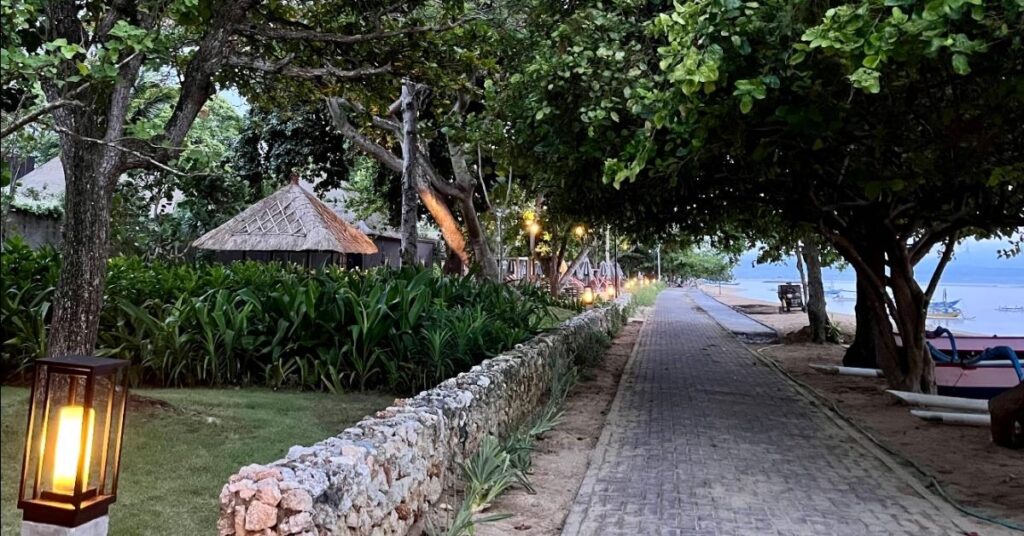
Ideal for: Retirees seeking a laid-back island lifestyle with excellent healthcare access. Anyone prioritizing flat walking surfaces over vibrant nightlife.
Not recommended for: Those wanting trendy designer boutiques or a bustling party scene.
Ratings (out of 10):
- Walkability/flat terrain: 9
- Healthcare facilities access: 9
- Medical insurance direct billing: 8
- Peaceful environment: 8
- Traffic stress: 7
- Age-appropriate community: 9
- Safety: 9
- English services: 9
- Affordable cost: 7
- Daily conveniences: 8
Monthly living expenses:
- 1-bedroom: $500–$900
- 2-bedroom: $800–$1,400
- Villa with pool: $1,200–$2,500
Medical services: BIMC Nusa Dua is located 20 minutes south. Kasih Ibu Hospital is 15 minutes away. Sanur International Hospital opened in 2024, right in the neighborhood. Multiple medical clinics line Jalan Danau Tamblingan.
Local amenities: Pepito supermarket, Hardy’s, Guardian pharmacy, plus numerous Indomaret and Alfamart stores within walking distance or a short ride.
Lifestyle notes: The beachfront promenade offers perfectly flat, paved paths ideal for daily walks. Residential streets stay quiet at night. Temple ceremonies occasionally create noise but typically end by 10 p.m. No challenging hills unless you choose upper-floor apartments.
Airport distance: 30–45 minutes, depending on traffic.
Local community: Sanur attracts a mature, thriving expat community with walking groups, book clubs, and regular social gatherings. The slower pace appeals to long-term residents.
Nusa Dua: Premium Resort Living
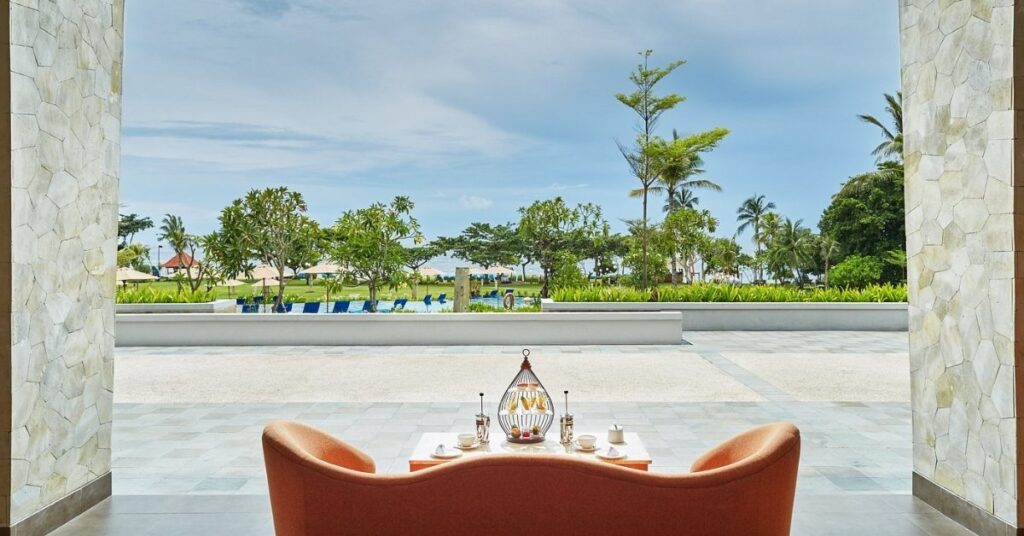
Ideal for: Retirees with comfortable budgets wanting resort-style living with golf courses and maximum safety. Those prioritizing modern conveniences over local charm.
Not recommended for: Budget-conscious retirees. Anyone seeking authentic local markets and affordable living.
Ratings:
- Walkability/flat terrain: 7
- Healthcare facilities access: 10
- Medical insurance direct billing: 9
- Peaceful environment: 9
- Traffic stress: 6
- Age-appropriate community: 7
- Safety: 10
- English services: 10
- Affordable cost: 5
- Daily conveniences: 6
Monthly living expenses:
- 1-bedroom: $900–$1,500
- 2-bedroom: $1,300–$2,200
- Villa with pool: $2,000–$4,000
Medical services: BIMC Hospital Nusa Dua provides comprehensive emergency care five minutes away, with direct billing for most international health insurance policies.
Local amenities: Pepito Express and convenience stores available, but serious grocery shopping requires driving to Bali Collection mall or Jimbaran.
Lifestyle notes: Exceptionally quiet at night. Mostly flat terrain within gated communities. Some gentle slopes but nothing challenging for most retirees.
Airport distance: 20–30 minutes.
Local community: The thriving expat community skews older and more affluent, with organized activities through beach clubs and golf courses rather than spontaneous gatherings.
Ubud: Cultural and Spiritual Heart
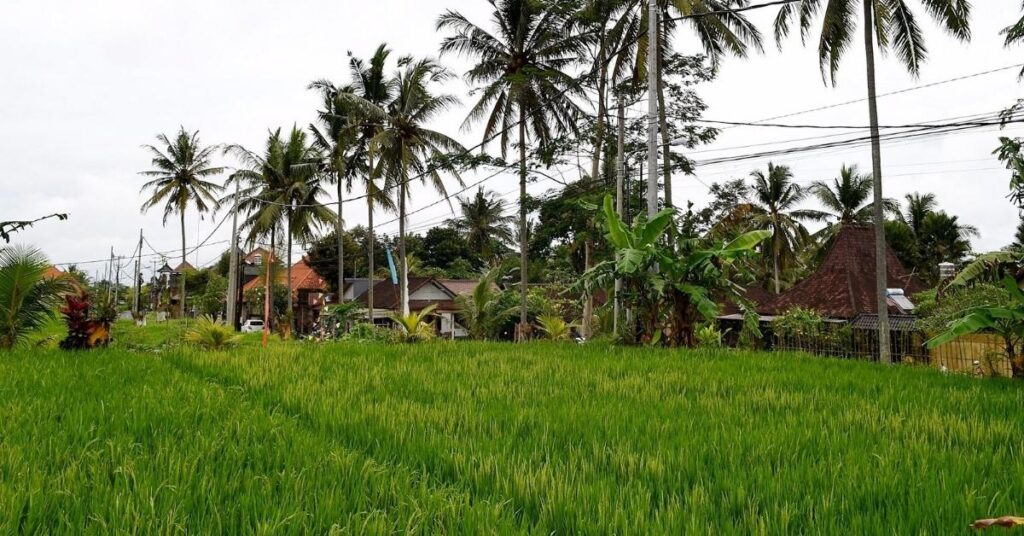
Ideal for: Those valuing cooler climate, rich culture, and natural beauty over beaches. Yoga enthusiasts and creative retirees who don’t mind hills.
Not recommended for: Anyone with mobility concerns. Retirees needing quick access to major healthcare facilities. Beach lovers.
Ratings:
- Walkability/flat terrain: 4
- Healthcare facilities access: 5
- Medical insurance direct billing: 5
- Peaceful environment: 7
- Traffic stress: 5
- Age-appropriate community: 6
- Safety: 8
- English services: 9
- Affordable cost: 7
- Daily conveniences: 7
Monthly living expenses:
- 1-bedroom: $500–$1,000
- 2-bedroom: $800–$1,600
- Villa with pool: $1,200–$3,000
Medical services: Local medical clinics handle routine care, but major hospitals in Denpasar or Sanur are 1–1.5 hours away for serious emergencies.
Local amenities: Bintang Supermarket, organic markets, and Guardian pharmacy. Good selection but spread out, requiring a scooter or driver.
Lifestyle notes: Central areas get noisy with traffic during the day but quiet down at night. Hills, stairs, and uneven paths make navigation challenging for those with joint issues.
Airport distance: 60–90 minutes.
Local community: Large yoga and wellness community mixing creative types with spiritual seekers. Age range skews younger than Sanur, though many retirees love Ubud’s atmosphere.
Jimbaran: Relaxed South Coast Haven
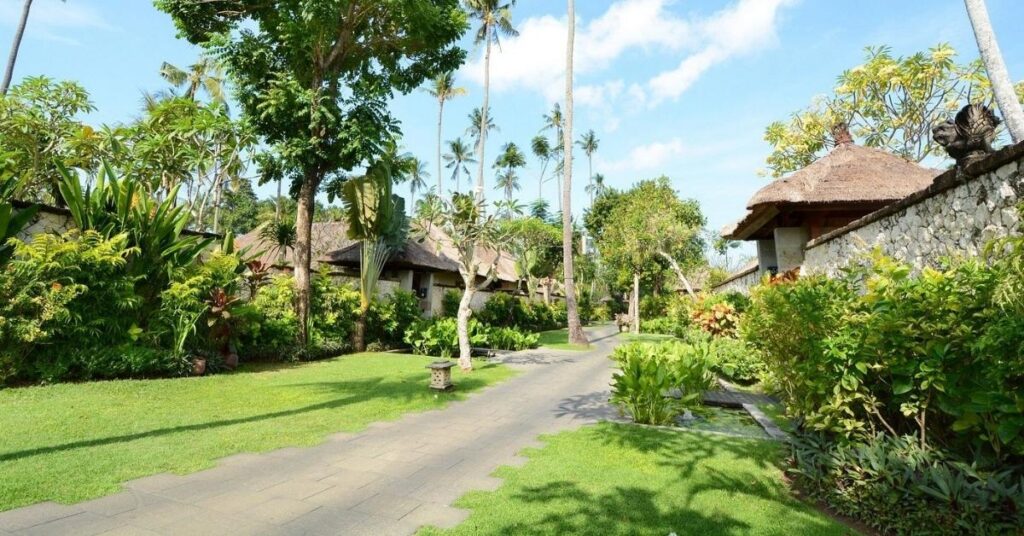
Ideal for: Retirees wanting a peaceful beach town atmosphere with seafood restaurants and family-friendly vibes. Balance between quiet and healthcare access.
Not recommended for: Budget-focused retirees. Anyone seeking vibrant nightlife or extensive social activities.
Ratings:
- Walkability/flat terrain: 6
- Healthcare facilities access: 8
- Medical insurance direct billing: 8
- Peaceful environment: 8
- Traffic stress: 6
- Age-appropriate community: 7
- Safety: 8
- English services: 8
- Affordable cost: 6
- Daily conveniences: 7
Monthly living expenses:
- 1-bedroom: $700–$1,200
- 2-bedroom: $1,000–$1,800
- Villa with pool: $1,500–$3,000
Medical services: BIMC Nusa Dua is 15–20 minutes. Kasih Ibu and Siloam hospitals are about 25 minutes away.
Local amenities: Pepito, Bali Deli, and Guardian Pharmacy provide a good selection, though larger shopping requires transport.
Lifestyle notes: Quiet nights except near the fish market. Mostly flat near stunning beaches, some hills inland.
Airport distance: 15–25 minutes.
Local community: Smaller but friendly expat presence, with more families and long-term residents than digital nomads.
Canggu, Pererenan, and Seseh: Social Hub
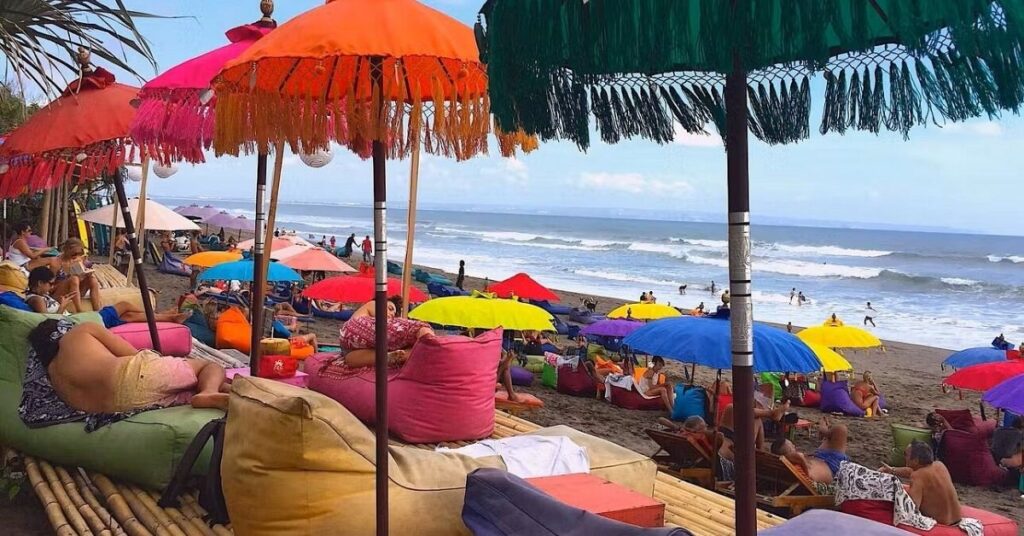
Ideal for: Active retirees wanting extensive fine dining restaurants, fitness facilities, and a thriving social scene. Those prioritizing community over tranquility.
Not recommended for: Noise-sensitive individuals. Anyone seeking a peaceful retreat or affordable living.
Ratings:
- Walkability/flat terrain: 6
- Healthcare facilities access: 6
- Medical insurance direct billing: 6
- Peaceful environment: 4
- Traffic stress: 3
- Age-appropriate community: 5
- Safety: 7
- English services: 10
- Affordable cost: 5
- Daily conveniences: 9
Monthly living expenses:
- 1-bedroom: $800–$1,500
- 2-bedroom: $1,200–$2,200
- Villa with pool: $1,800–$4,000
Medical services: Kasih Ibu about 30 minutes, BIMC Kuta about 25 minutes. Medical clinics locally, but no major hospital in Canggu.
Local amenities: The Deli, Crate Cafe, Pepito, Frestive, multiple convenience stores. Everything available with easy delivery.
Lifestyle notes: Noisy with clubs, bars, and live music until late. Terrible traffic on main roads like Batu Bolong and Pantai Berawa. Mostly flat terrain, but with inconsistent sidewalks.
Airport distance: 45–75 minutes, depending on traffic.
Local community: Massive thriving expat community with running clubs, fitness groups, business meetups, and dinner clubs. Age skews younger (30s–40s), but retirees participate actively.
Seminyak, Legian, and Kuta: Central Convenience
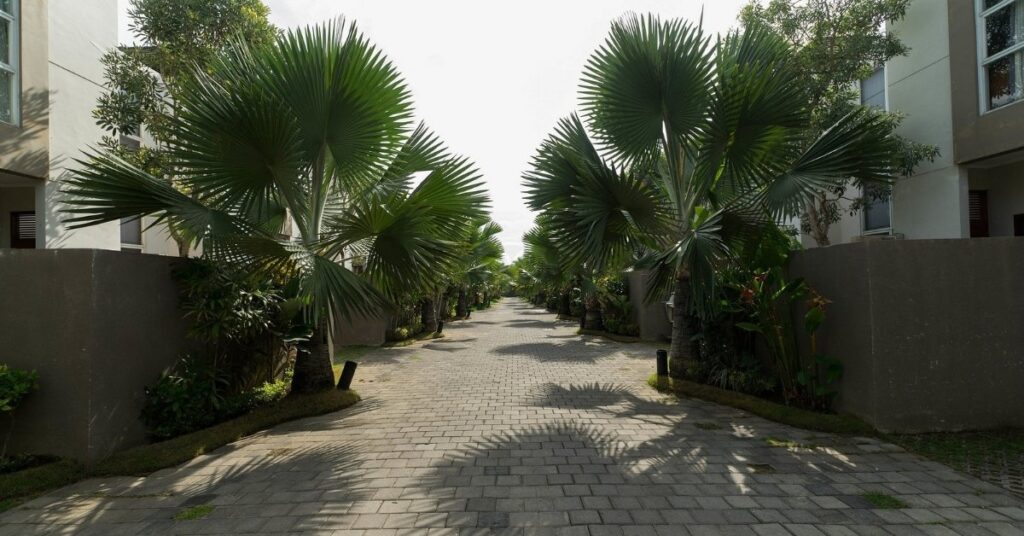
Ideal for: Retirees wanting maximum access to fine dining restaurants, shopping, designer boutiques, and services. Those who thrive on energy and variety.
Not recommended for: Light sleepers. Anyone seeking a peaceful retreat or affordable retirement.
Ratings:
- Walkability/flat terrain: 7
- Healthcare facilities access: 7
- Medical insurance direct billing: 7
- Peaceful environment: 3
- Traffic stress: 4
- Age-appropriate community: 5
- Safety: 7
- English services: 10
- Affordable cost: 5
- Daily conveniences: 10
Monthly living expenses:
- 1-bedroom: $800–$1,600
- 2-bedroom: $1,200–$2,500
- Villa with pool: $2,000–$4,500
Medical services: BIMC Kuta 10–20 minutes. Kasih Ibu about 20 minutes.
Local amenities: Everything available, Bintang Supermarket, Pepito, Guardian, Watson’s provide complete convenience.
Lifestyle notes: Loud, especially near Legian Street and Seminyak’s nightlife strips. Kuta near the airport can feel chaotic. Flat terrain throughout.
Airport distance: 15–30 minutes.
Local community: Huge expat presence but younger and more transient. Great for meeting new people constantly, less community stability than Sanur.
Uluwatu and the Bukit Peninsula: Clifftop Views
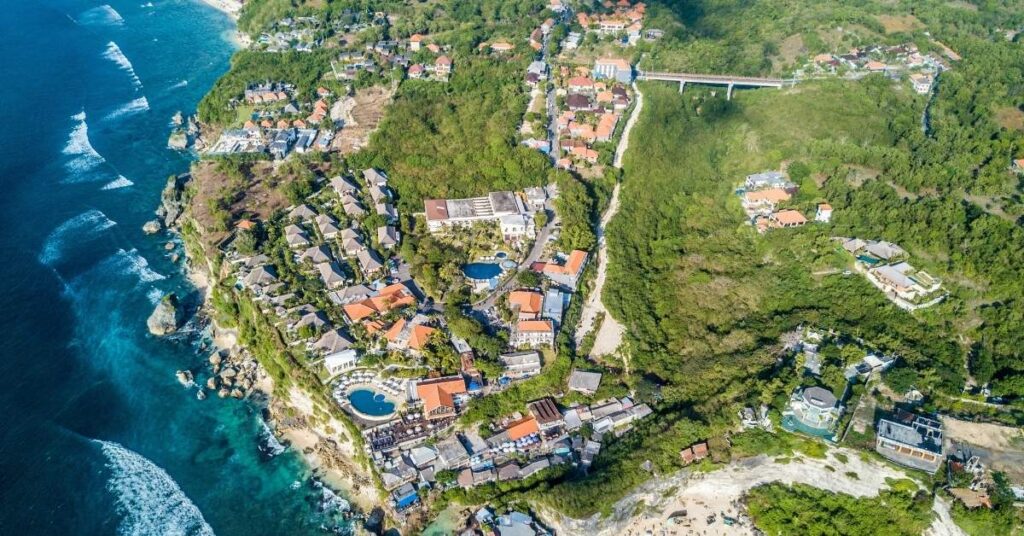
Ideal for: Healthy, active retirees loving dramatic ocean views who don’t mind driving everywhere. Surfers. Those wanting seclusion with stunning natural beauty.
Not recommended for: Anyone with mobility challenges. Retirees without a local driving license. Those wanting walkable daily conveniences.
Ratings:
- Walkability/flat terrain: 3
- Healthcare facilities access: 6
- Medical insurance direct billing: 7
- Peaceful environment: 7
- Traffic stress: 5
- Age-appropriate community: 6
- Safety: 8
- English services: 8
- Affordable cost: 6
- Daily conveniences: 5
Monthly living expenses:
- 1-bedroom: $600–$1,200
- 2-bedroom: $1,000–$2,000
- Villa with pool: $1,500–$3,500
Medical services: BIMC Nusa Dua 20–30 minutes away. Navigating steep driveways during emergencies can be challenging.
Local amenities: Pepito, Deli, and small shops require driving. No walking to groceries.
Lifestyle notes: Quiet in residential areas, though some spots near beach clubs get rowdy. Steep driveways, extensive stairs, and clifftop locations create beautiful but challenging living conditions.
Airport distance: 30–45 minutes.
Local community: Smaller expat presence, mostly surfers and villa owners. Less organized social life than Sanur or Canggu.
Candidasa: East Coast Value
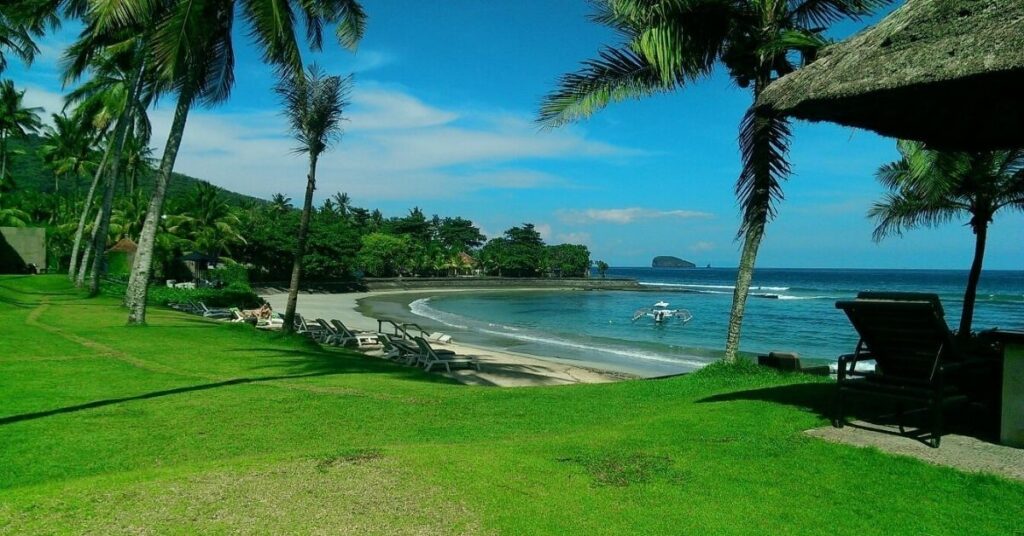
Ideal for: Budget-conscious retirees wanting a quiet seaside lifestyle without big-city amenities. Snorkeling and diving enthusiasts value calm over convenience.
Not recommended for: Anyone needing quick healthcare facility access. Those wanting extensive English-speaking services or a bustling social scene.
Ratings:
- Walkability/flat terrain: 7
- Healthcare facilities access: 3
- Medical insurance direct billing: 3
- Peaceful environment: 9
- Traffic stress: 9
- Age-appropriate community: 7
- Safety: 8
- English services: 6
- Affordable cost: 9
- Daily conveniences: 5
Monthly living expenses:
- 1-bedroom: $300–$600
- 2-bedroom: $500–$900
- Villa with pool: $700–$1,500
Medical services: Local medical clinics only. Major hospitals require 1.5–2 hour drives to Sanur or Denpasar.
Local amenities: Small local shops and markets. Limited Western products. Stock up during trips south.
Lifestyle notes: Very quiet and peaceful. Mostly flat along the coast road, perfect for those seeking simplicity and lower living expenses.
Airport distance: 90–120 minutes.
Local community: Small, tight-knit expat presence. More retirees than digital nomads, but limited organized activities.
Lovina and North Bali: Ultimate Tranquility
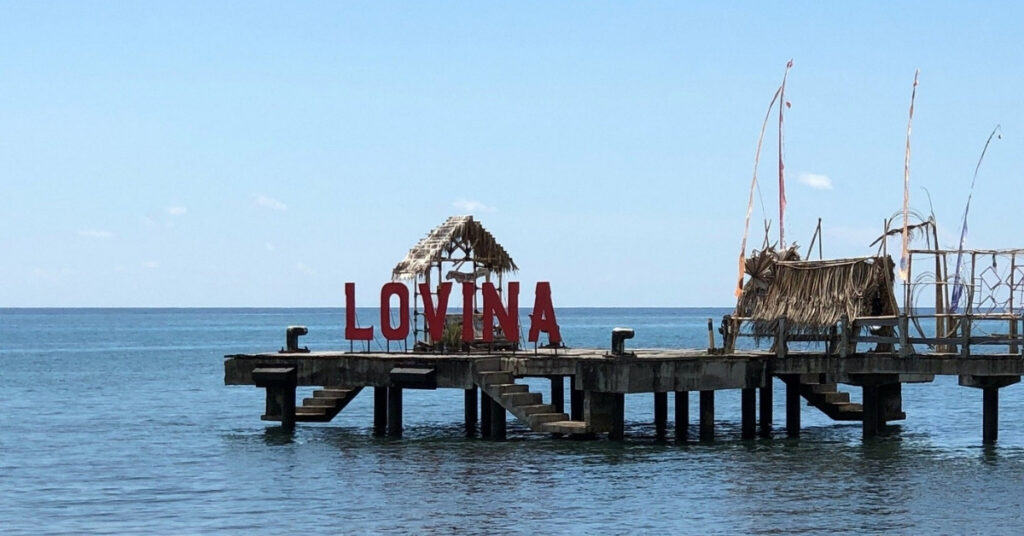
Ideal for: Retirees seeking the lowest living expenses, dramatic mountain-and-sea scenery, and true peaceful retreat. Divers. Those loving small-town life.
Not recommended for: Anyone with health concerns needing specialist care. Those wanting variety in restaurants and modern conveniences.
Ratings:
- Walkability/flat terrain: 7
- Healthcare facilities access: 2
- Medical insurance direct billing: 2
- Peaceful environment: 9
- Traffic stress: 10
- Age-appropriate community: 7
- Safety: 8
- English services: 5
- Affordable cost: 10
- Daily conveniences: 4
Monthly living expenses:
- 1-bedroom: $250–$500
- 2-bedroom: $400–$800
- Villa with pool: $600–$1,200
Medical services: Small medical clinics locally. Major hospitals 2.5–3 hours away in Denpasar, serious concern for emergencies.
Local amenities: Basic shops and local markets. Limited Western products.
Lifestyle notes: Incredibly quiet and peaceful. Mostly flat along the coast, with inland areas getting hilly.
Airport distance: 2.5–3.5 hours.
Local community: Very small expat community. Friendly but sparse, ideal for solitude seekers.
Denpasar: Affordable Urban Living
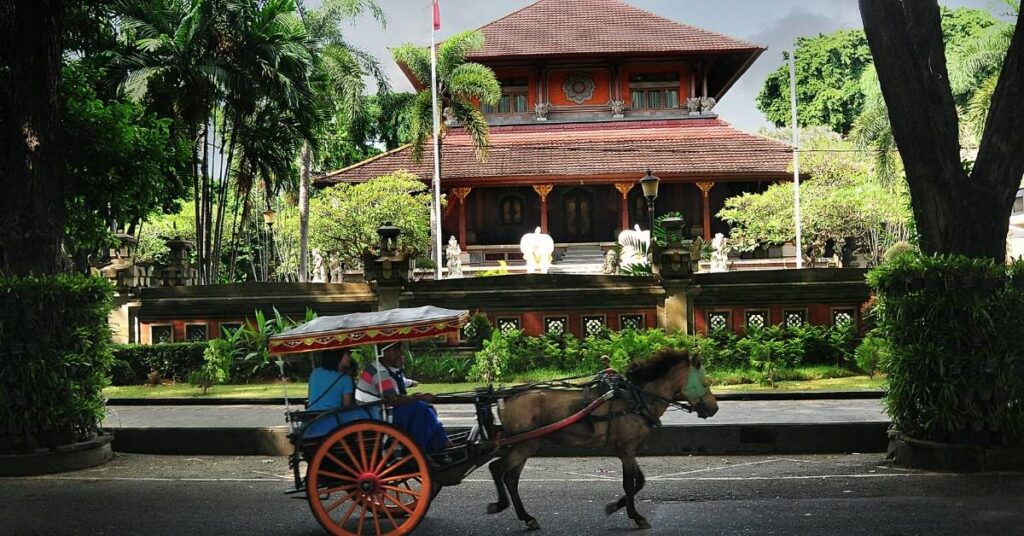
Ideal for: Budget-conscious retirees wanting healthcare facility access, markets, and services without beach-town prices. Those who don’t need ocean views.
Not recommended for: Anyone seeking resort atmosphere or stunning natural beauty. Those who hate urban noise and traffic.
Ratings:
- Walkability/flat terrain: 5
- Healthcare facilities access: 10
- Medical insurance direct billing: 9
- Peaceful environment: 5
- Traffic stress: 4
- Age-appropriate community: 6
- Safety: 8
- English services: 7
- Affordable cost: 9
- Daily conveniences: 10
Monthly living expenses:
- 1-bedroom: $300–$700
- 2-bedroom: $500–$1,100
- House with yard: $700–$1,500
Medical services: Central location near Kasih Ibu, Siloam, Prima Medika, all within 10–15 minutes.
Local amenities: Every major chain, traditional markets, and pharmacies are everywhere. Complete convenience for daily life.
Lifestyle notes: Urban noise from traffic, mosques, and street vendors. Flat terrain in most areas. Lower living expenses than beach destinations.
Airport distance: 20–40 minutes.
Local community: Smaller expat community than beach areas, better integration with the local community. Good for learning Indonesian language and rich culture.
Healthcare and Medical Insurance for Retirees
Quality healthcare matters immensely when choosing where to retire in Bali. You need to know which medical facilities accept health insurance direct billing versus requiring upfront payment.
Medical Insurance and Direct Billing
Direct billing means hospitals charge your health insurance provider directly instead of requiring upfront payment with later reimbursement. This matters significantly for surgery or hospital stays.
BIMC hospitals (Nusa Dua and Kuta) and Siloam maintain direct billing arrangements with international health insurance companies, including Cigna Global, Allianz, Bupa, AXA, and Pacific Prime. Kasih Ibu works with some medical insurance providers; verify with your specific company.
Typical costs without health insurance:
- GP visit: $30–$50
- Specialist consultation: $50–$100
- Emergency room (minor): $100–$300
- Emergency room (serious): $500–$2,000+
- Surgery (appendectomy): $3,000–$8,000
- Hospital stay per night: $200–$800
Medical Evacuation Reality
For serious emergencies, strokes, major heart attacks, or severe accidents, evacuation to Singapore or Australia may be necessary. Bali’s medical facilities handle routine and moderate care well, but aren’t equipped for highly complex cases.
Medical evacuation costs $15,000–$50,000+. Most comprehensive health insurance plans include this coverage; if yours doesn’t, seriously consider upgrading.
Preventive Care and Specialists
Preventive care: Annual checkups and blood work are affordable. Expect $100–$200 for comprehensive physicals.
Dental services: Bali offers excellent, affordable dental care. Cleaning and checkup: $30–$50. Crowns: $200–$400. Implants: $800–$1,500.
Vision care: Eye exams cost $20–$40. Glasses range from $50 for basic frames to $200+ for premium options.
Physiotherapy: $25–$50 per session, valuable for ongoing joint issues.
Finding specialists: All major hospitals employ English-speaking doctors. Expat Facebook groups provide excellent recommendations. Search “Bali Expats” or “Sanur Expats” for referrals.
Health Concierge Services
Some companies offer health concierge services in Bali, local advisors who help navigate the healthcare system, book appointments, translate if needed, and coordinate with medical insurance. Expect $50–$150 monthly for basic packages.
Daily Life, Mobility, and Safety
Retirement success depends on navigating daily life without constant stress.
Walking Surfaces and Accessibility
Best for walking: Sanur’s paved beachfront promenade. Nusa Dua resort areas stay clean and flat. Jimbaran beachfront works well.
Challenging: Ubud features hilly terrain with uneven paths and extensive stairs. Uluwatu and the Bukit Peninsula have steep driveways and stairs. Canggu and Seminyak have sidewalks that randomly disappear.
Wheelchair access: Limited everywhere except inside luxury resorts and major hotels. Sanur and Nusa Dua offer your best options.
Nighttime lighting: Varies significantly. Main roads typically have adequate lighting. Side streets can be dark. Sanur and Nusa Dua maintain better lighting than the Canggu or Ubud back roads.
Transportation Options
Bluebird and Grab taxis: Reliable and affordable. Most local rides cost $2–$5.
Private drivers: Hiring a driver for 6–8 hours costs $40–$60, practical for regular errands or appointments.
Scooters: Be honest about your abilities. If you’re over 65 without prior scooter experience, chaotic traffic and unpredictable road conditions make this risky. Too many expats end up in hospitals after accidents.
Cars: Lease or rental agreement costs run $300–$500 monthly. Parking is tight in Seminyak and Canggu, but manageable in Sanur and Nusa Dua. You’ll need an international driving permit initially, then you can apply for a local driving license.
Retirement Visa Options: Current Requirements
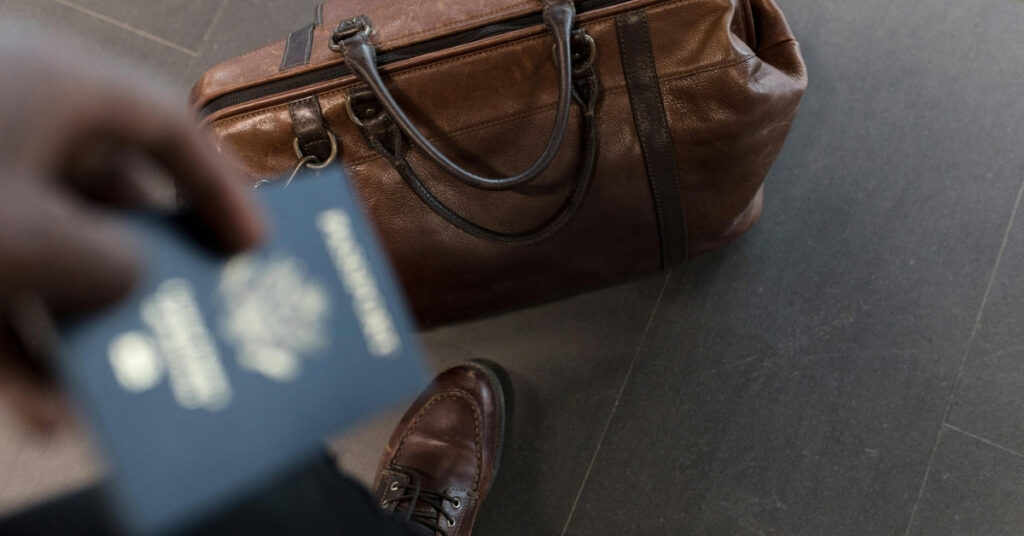
Indonesia regularly updates retirement visa requirements. Always verify current rules with licensed immigration agents before committing.
Retirement KITAS (KITAS Lansia)
This remains the primary retirement visa option as of October 2025.
Minimum age requirement: 55 years or older.
Financial requirement: Must prove regular pension or income of at least $3,000 USD monthly. Proof of Bank Balance of $2,000 USD for the last 3 months.
Other requirement: Hire at least one Indonesian citizen as a domestic helper
- Valid passport (minimum 18 months’ validity)
- Proof of pension or retirement income
- Health insurance covering Indonesia
- Home country police reference letter (background check)
- Sponsor letter (usually from Indonesian agent)
- Recent photographs
- Marriage certificate if the spouse applies
Initial validity: 1 year, renewable annually.
Upgrade path: After 5 years of continuous KITAS renewals, you may apply for KITAP (a temporary stay permit that’s valid 5 years at a time).
Retirement visa cost: Expect $700–$1,200 for an initial application through an agent, including government fees. Annual renewals cost $400–$600.
Work restrictions: You cannot work with a retirement KITAS. Volunteering is generally acceptable; verify specific cases with your agent.
Second-Home Visa
Indonesia launched this program in 2024.
Requirements:
- Bank deposit: Proof of USD 130,000 in your own account at an Indonesian state bank, BNI, BRI, or Mandiri.
- Property ownership: Show you own a luxury home in Indonesia valued at USD 1,000,000+
Validity: 5 or 10 years, depending on the tier chosen. Can be extended.
Family inclusion: Can include spouse and children.
Benefits: Multiple-entry visa, indefinite stay while maintaining financial requirements.
Retirement visa cost: Government fees around $2,000–$3,000, plus agent fees.
Best suited for: Retirees planning property investment or those comfortable parking significant funds in Indonesian accounts. Consult a financial planner about tax implications in your home country.
Other Long-Stay Options Under 55
Under 55/60? Here are long-term visa options for you.
- Remote Worker KITAS (E33G) runs 1 year. Work KITAS offers 6 months, 1 year, or 2 years.
- Investor KITAS starts at 1–2 years, extendable up to 6 years total.
- Spouse/Family KITAS (as a dependent or WNI spouse) is 1–2 years with a path to a 5-year KITAP.
- Business/Tourist Multiple-Entry (D1/D2) visas are valid 1, 2, or 5 years; each entry gives 60 days, extendable to 180 days per visit.
- Tourist Visa C1 (single-entry) starts at 60 days, extendable to 180 days total. Pick your lane, then plan the rest.
Now, here’s what you really need to know: doing this stuff yourself is a headache. Forms, translations, and government offices that close early. You’ll be running around like crazy.
At Visa-Indonesia.com, we sit beside you (figuratively), explain what each doc is for, cut the fluff, and turn the rules into one clear to-do list. We prep your file the way officers expect and keep you in the loop, so there’s no “one more document” surprise at the window.
We’ve helped 41,000+ people get approved, with zero rejections to date. That’s because this is all we do, every day, in step with immigration. When the rules shift (they do), your file shifts with them.
Have questions? Chat with a real specialist. We’ll tell you exactly what’s needed for your case and the total cost before you decide. Connect with an Indonesia Visa specialist.
Important Visa Disclaimer
Retirement visa requirements in Indonesia change regularly. This information reflects January 2026 based on official immigration documents and licensed agent consultations. By the time you read this, income requirements, document lists, or the retirement visa cost may have changed.
Always verify current rules with:
- Official Indonesian immigration websites
- Licensed Indonesian visa agents (get recommendations from expat Facebook groups)
- Your home country’s embassy in Jakarta
Don’t rely solely on online guides for final decisions. Seek advice from qualified professionals.
Taxes, Banking, and Financial Matters

Understanding financial obligations helps you plan to retire comfortably.
You become a tax resident after staying more than 183 days annually or holding a long-stay visa like a retirement KITAS. Most western countries including the US, UK, and Australia, maintain tax treaties preventing double taxation. Consult a qualified tax advisor, preferably one experienced with expat situations, before moving.
For banking, you need a retirement KITAS to open a local bank account. Expats commonly choose BCA, Mandiri, or CIMB Niaga for English-speaking local staff and solid online banking. On tourist visas, keeping money abroad and using Wise for transfers proves cheaper and faster than traditional bank wires. You’ll need a bank account statement showing adequate funds during the application process.
Credit cards can be difficult to obtain in Indonesia, so maintain your home country cards. Remember, cash remains essential here. Most small shops and local eateries don’t accept cards, so always carry rupiah for daily life.
Try Before You Move: 30/60/90-Day Plan
Bali offers a dream destination for retirement with its stunning natural beauty, lush rice terraces, warm hospitality, and relaxed lifestyle. But, don’t commit to retiring in Bali until you’ve lived here through different seasons and situations. Here’s how to test it properly.
30-Day Plan: Pick Two Contrasting Bases
Rent an Airbnb or short-term rental in two very different areas for 2 weeks each. I recommend:
- Sanur (quiet, flat, mature crowd) + Canggu (social, noisy, younger vibe), OR
- Nusa Dua (resort, expensive) + Ubud (culture, hills), OR
- Candidasa (remote, cheap) + Seminyak (central, pricey)
What to test:
- Walk to get groceries, coffee, and pharmacy
- Eat at local warungs, mid-range restaurants
- Track every expense (you’ll be surprised)
- Note the noise levels at different times
- Test Grab, Bluebird, or hire a driver for a day
- Visit a clinic or hospital (even just for a checkup)
- Attend a community meetup or expat event
What you’ll learn: Which vibe suits you, what you actually spend, whether you can handle the heat/humidity, and if you’re comfortable navigating daily life.
60-Day Plan: Test Medical, Groceries, and Rainy Season
Now dig deeper. Spend 2 months in your top-choice area.
What to test:
- Schedule a doctor’s appointment. Bring your insurance card and see if direct billing works.
- Test the dentist, get a cleaning.
- Do a full grocery shop and cook at home for a week. See if you can find what you need.
- If it’s rainy season (November–March), expect flooding, traffic slowdowns, and indoor humidity. If it’s dry season, imagine it hotter and wetter.
- Rent a scooter or car and drive around (if you plan to drive).
- Attend multiple community events, yoga classes, walking groups, and social meetups.
If you need help with your travel documents, you can use visa support services for Indonesia.
What you’ll learn: Whether healthcare is manageable, if the food situation works for you, how weather affects your daily life, and whether you’re building friendships or feeling isolated.
90-Day Plan: Budget Reconciliation and Final Decision
Spend 3 months (use a tourist visa extended twice to hit 180 days total, or combine tourist entries).
What to test:
- Live on your planned retirement budget for the full 90 days. No cheating.
- Track every rupiah: rent, utilities, food, transport, entertainment, medical, visas.
- Experience at least one holiday period (Christmas/New Year or July–August) to see how prices spike.
- Visit other areas on your short list for weekend trips to confirm your choice.
- Talk to long-term expats about challenges you haven’t thought of.
Budget reconciliation:
- Compare your planned budget to actual spending
- Add 15–20% buffer for surprises
- Factor in annual trips home, visa fees, and insurance premiums
- Account for currency fluctuation risk
Final decision: By day 90, you should know:
- Which specific neighborhood do you want
- Your realistic monthly budget
- Whether you’re happy with healthcare access
- If you’re building community or feeling lonely
- Whether Bali actually works for your daily life
If you finish 90 days and feel excited, go for it. If you’re relieved to leave, be honest with yourself. Retiring somewhere isn’t the same as vacationing there.
Frequently Asked Questions (FAQs)
Is Bali safe for retirees?
Yes, Bali is generally safe. Violent crime is rare. The main risks are:
- Petty theft (pickpocketing in crowded areas, bag-snatching from scooters)
- Scams (taxi overcharges, fake tour operators)
- Traffic accidents (especially on scooters)
- Food safety (occasional stomach issues from street food or tap water)
Use common sense: don’t flash valuables, use registered taxis, wear a helmet if you ride a scooter, and drink bottled water. Most retirees feel safer in Bali than in major cities back home.
Can I Retire Comfortably on $1,500 a month in Bali?
Yes, but your options are limited. You’ll need to:
- Live in Denpasar, Candidasa, or Lovina (not Seminyak or Canggu)
- Rent a simple place without a pool
- Cook most meals at home and eat at local warungs
- Use Grab or a scooter instead of private drivers
- Skip expensive hobbies like golf
- Self-insure or carry basic local insurance
It’s doable, but tight. $2,000–$2,500/month gives you much more breathing room.
What’s the best place if I don’t drive?
Sanur. You can walk most places, and Grab is cheap and reliable. The area is flat, the sidewalks are decent, and you’re close to hospitals, supermarkets, and restaurants.
Nusa Dua works, too, if you have a bigger budget, but since things are spread out, you’ll rely more on taxis.
Avoid Ubud, Uluwatu, Candidasa, and Lovina; you really need your own transport there.
Which areas have the quietest nights?
Quietest to loudest:
- Candidasa – Almost silent except for ocean waves
- Lovina – Peaceful, small-town feel
- Nusa Dua – Resort quiet (assuming you’re not near beach clubs)
- Sanur – Gentle, occasional temple ceremonies
- Jimbaran – Calm except near the fish market area
- Ubud – Quiet at night, busy during the day
- Denpasar – Urban noise but no nightclub bass
- Uluwatu – Depends on exact location; some spots are quiet, others are party-heavy
- Pererenan/Seseh – Depends on street; hit-or-miss
- Canggu – Noisy, especially near Batu Bolong
- Seminyak – Loud nightlife until late
- Kuta/Legian – Very loud near the main strips
Do I need to speak Indonesian?
No, but learning basic phrases helps. In tourist areas (Sanur, Canggu, Seminyak, Ubud, Nusa Dua), most people speak enough English to help you. Hospitals, clinics, banks, and shops in these areas all have English-speaking staff.
In Denpasar, Candidasa, and Lovina, English is less common. You’ll manage, but knowing numbers, directions, and common food words makes life easier.
Even learning “Selamat pagi” (good morning), “Terima kasih” (thank you), and “Berapa harganya?” (how much?) goes a long way. Locals appreciate the effort.
What about natural disasters?
Bali has a few natural risks:
Earthquakes: Indonesia is on the Ring of Fire. Small quakes happen occasionally. Major destructive earthquakes are rare but possible. Buildings in tourist areas generally follow decent standards.
Tsunamis: Coastal areas have some risk, especially the south and east coasts. Know where the evacuation routes are if you live near the beach.
Volcanic eruptions: Mount Agung occasionally has activity. It can disrupt flights and cover parts of the island in ash. It’s not usually dangerous if you’re not on the mountain itself, but it’s disruptive.
Flooding: During the heavy rainy season, some low-lying areas flood. Check local knowledge about which streets flood before you sign a lease.
Most retirees don’t let these concerns stop them. Just be aware and have a plan.
Can I bring my pet?
Yes, but it’s complicated. Indonesia has strict import requirements for pets:
- Microchip and rabies vaccination
- Import permit (arranged before arrival)
- Health certificate from your vet
- Quarantine period (can be 14–30 days, depending on paperwork)
- Costs can run $500–$2,000, including flights, permits, and quarantine
Many expats bring dogs and cats. Bali has good local vets. Finding pet-friendly rental housing is harder, but doable; expect to pay a deposit and possibly higher rent.
What if I need to leave quickly (family emergency, health issue)?
Keep an emergency fund that covers:
- Last-minute flight home ($800–$2,000 depending on destination and timing)
- Breaking your lease (usually 1–2 months’ rent)
- Packing and shipping essentials (or storage if you plan to return)
Flights to major hubs (Singapore, Kuala Lumpur, Bangkok, Australia) run multiple times daily. You can usually get out within 24–48 hours if needed.
If you have a serious health issue requiring evacuation, good international insurance will arrange and cover medical flights.
Ready to Apply or Extend Your Visa?
Let our visa specialists handle your application.








